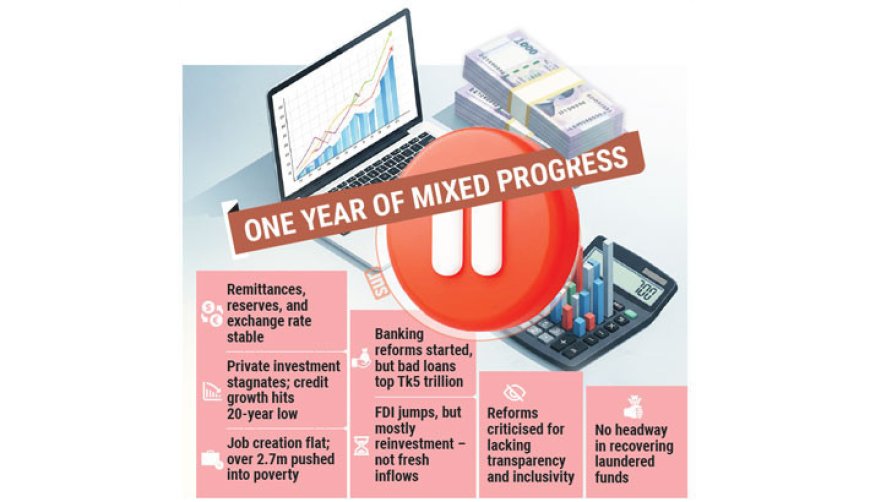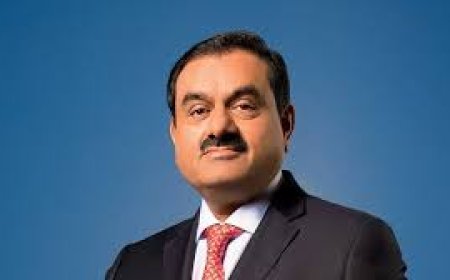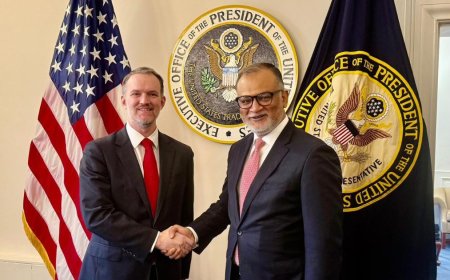Investment Slows, Reforms Trail Behind Despite Economic Progress
Investment Slows, Reforms Trail Behind Despite Economic Progress

One Year In: Economic Gains Tempered by Reform Delays and Investment Stagnation
As Bangladesh’s interim government completes its first year, the economic landscape presents a mixed picture—marked by modest gains in some areas, yet overshadowed by unresolved structural weaknesses.
Inflation has begun to ease, the banking sector is showing signs of stabilisation, and foreign exchange reserves are no longer in free fall thanks to increased dollar inflows. However, challenges like sluggish private investment, stagnant job growth, and a fragile business climate continue to weigh heavily.
Business leaders and economists attribute the underwhelming reform outcomes to a lack of transparency, participation, and strategic clarity. While steps have been taken to stabilise the macroeconomy and manage external debt pressure, broader goals such as employment generation and investor confidence remain elusive. With elections approaching, calls are growing for more inclusive and far-reaching economic measures.
Reform Momentum Falters
Dr Mostafa K Mujeri, Executive Director of the Institute for Inclusive Finance and Development (InM) and a former Chief Economist at Bangladesh Bank, noted that reform expectations were high when the interim government assumed office. However, he told the Daily Sun that progress has been limited and uneven.
“Despite initial hopes, no major structural reforms have been implemented. Some of the attempts have been counterproductive, further aggravating existing problems,” he said, adding that institutional reform efforts have largely faltered.
Echoing this, Dr Zahid Hussain, former lead economist at the World Bank’s Dhaka office, said the government’s core agenda—restoring macroeconomic stability, reigniting growth and employment, and initiating structural reform—remains largely unfulfilled.
“The interim administration pulled the economy back from the edge, but it hasn’t yet placed it on firm footing,” he observed. Investment has declined, employment remains stagnant, and while there’s been some movement in the banking sector, reforms in tax policy and energy remain inadequate.
Stabilisation Amid Deeper Fault Lines
According to Towfiqul Islam Khan, Senior Research Fellow at the Centre for Policy Dialogue (CPD), there has been some progress in stabilising macroeconomic indicators.
“The bleeding in banking has been stopped. Dollar liquidity has improved, reserves are more stable, and inflation is coming down gradually,” he said.
Still, Khan pointed to persistent shortcomings in domestic revenue mobilisation and public spending oversight. “Project implementation and curbing cost inflation have yet to meet expectations,” he noted.
Business Sentiment Still Grim
Voices from the business sector paint a more sobering picture. Rizwan Rahman, former president of the Dhaka Chamber of Commerce & Industry, acknowledged the government’s efforts to contain inflation but expressed concern over worsening law and order and a stagnant business environment.
“They claim foreign direct investment is rising, but there’s no clarity on where that money is going,” Rahman said. “Banking reforms alone haven’t restored confidence.”
Anwar-Ul Alam Chowdhury Parvez, President of the Bangladesh Chamber of Industries (BCI), offered a stark assessment: “Retail has collapsed, SMEs are vanishing, and manufacturing is operating at a loss. Most entrepreneurs are simply trying to survive.”
Economic Headwinds Intensify
The interim government’s tenure has coincided with significant stress in the industrial sector. Factory closures due to weak demand, high input costs, and energy shortages have triggered job losses and constrained new employment.
High bank lending rates—hovering at 16–17%—have curbed private sector borrowing. Capital machinery imports have plummeted, with LC openings and settlements declining by over 25% in FY25. Private credit growth fell to 6.4% in June 2025, the lowest in over two decades.
While Q1 2025 saw a 114% year-on-year increase in FDI to $865 million, much of this was due to reinvested earnings and intra-company loans rather than new inflows—raising questions about sustainability.
Inflation Eases, Poverty Deepens
The central bank, under Governor Ahsan H Mansur, implemented three rate hikes to combat inflation, which fell to 8.48% in June—the lowest in over two years.
However, poverty has worsened. According to World Bank data, 2.7 million people—1.8 million of them women—slipped into poverty during the interim period.
CPD’s Khan reiterated: “The core issues are still investment and employment. Political uncertainty is deterring private sector activity. Greater transparency and inclusion are essential for meaningful reform.”
Deteriorating Growth Outlook
GDP growth for FY25 is projected at just 3.9%, according to the Bangladesh Bureau of Statistics (BBS)—a sharp drop from recent years. The World Bank, IMF, and ADB have all issued similarly downbeat forecasts, predicting modest recovery only in 2026.
Banking Reforms Incomplete
Despite some stabilisation, the banking sector continues to struggle. Non-performing loans have exceeded Tk 5 trillion, while efforts to merge and restructure troubled banks remain slow and politicised.
Mujeri noted that weak governance and ineffective enforcement still plague the system. “Progress in strengthening fragile banks has been minimal,” he said.
He also cautioned that recent improvements in remittance and exports cannot be attributed to policy success, as they largely stemmed from narrowing the exchange rate gap that reduced the appeal of informal channels.
Anti-Corruption Efforts Lose Steam
The interim government’s much-publicised anti-corruption drive—aimed at recovering an estimated $240 billion siphoned abroad—has stalled. Despite account freezes and public statements, there has been little in the way of tangible recovery or prosecution, raising doubts about the initiative’s credibility and coordination.
What's Your Reaction?





















































































